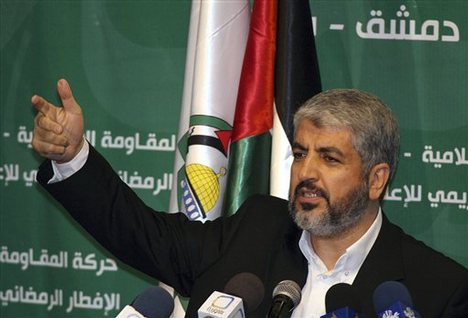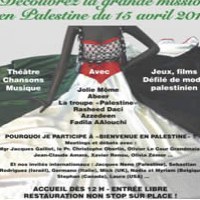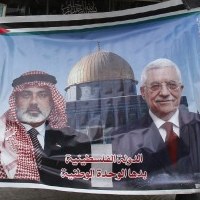![]()
Sun, May 15, 2011 | The Meir Amit Intelligence and Terrorism Information Center
Radical Islamist Hamas Movement Struggles to Present a Moderate Image Since the Palestinian Reconciliation Agreement
Statements made by senior Hamas figures since the internal Palestinian reconciliation agreement attempt to present a moderate image while restating Hamas’ refusal to recognize Israel or accept the International Quartet’s conditions, continuing the “resistance” (i.e., terrorism), and drawing Fatah back into the cycle of violence.
Overview
Following the May 4, 2011 signing of the internal Palestinian reconciliation agreement, senior Hamas figures made statements meant to present a pragmatic image to the West and an attitude of reconciliation toward the Palestinian Authority. However, in the same breath, Hamas political bureau head Khaled Mashaal and other figures said that even after the reconciliation agreement, Hamas had not abandoned its rigid fundamental positions regarding the Israeli-Palestinian conflict.
In official statements, senior Hamas figures made it clear that they regarded themselves as integrated into the decision-making process regarding political issues during the term of the interim government set up within the framework of the reconciliation agreement. However, they emphasized that Hamas would adhere to the path of “resistance” [i.e., terrorism], although they were prepared to reach an agreement with Fatah/the Palestinian Authority regarding how the “resistance” would be conducted. They repeatedly emphasized that Hamas rejected recognizing Israel (even if a Palestinian state within the 1967 borders were established), and that it would not accept decisions made by the International Quartet, which, they claimed, was no longer relevant now that the internal Palestinian reconciliation agreement had been signed.
However, in order not to be regarded as sabotaging the reconciliation agreement, they also said that they would not oppose the Palestinian Authority’s political move in the United Nations leading to the establishment of a Palestinian state within the 1967 borders. However, that would be on the condition that it was not accompanied by recognition of Israel or the waiving of the Palestinian refugees so-called “right of return.” Therefore, they would enable the Palestinian Authority to carry out its UN move in September 2011, even if they did not believe in it (“empty rhetoric,” “a political circus”).
The following are statements made by Khaled Mashaal, head of the Hamas political bureau in Damascus, and other senior Hamas figures in the wake of the reconciliation agreement:
Source of authority to make decisions regarding the Israeli-Palestinian conflict
Interviewed by Egypt’s Nile TV on May 9, Khaled Mashaal said that during the term of the interim government, which would last a year, not only Mahmoud Abbas and his aides would be responsible for political decisions, but a “temporary leadership body” as well [i.e., Hamas regards itself as integrated into the temporary leadership within the decision-making process].[1]
Khaled Mashaal added that he was aware that during the interim period many obstacles would have to be overcome by both sides. He said he hoped the atmosphere of reconciliation would make it possible to make decisions through national unity without external interference and “intrigues.”
Adherence to the path of terrorism (“resistance”) but readiness to discuss how to conduct it
During the May 9 interview with Nile TV, Khaled Mashaal said that Hamas’ ideology was based on “resistance,” from which it took its name (Hamas is the acronym in Arabic of “Islamic resistance movement”). He said Hamas believed that “resistance” [i.e., terrorism] was a “legitimate right” and claimed that there was no disagreement about “the principle of resistance” within the Palestinian arena. However, he added that implementing the principle, determining its forms [i.e., the types of terrorist attacks] and timing, and the question of whether to choose a lull in the fighting or escalation, were all decisions which would be made by “national Palestinian decision.” In any event, in the past Hamas had applied the “principle of resistance” and would continue to do so in the future, until the Israeli “occupation” ended (Nile TV, May 9, 2011).
Interviewed by Hamas’ Al-Aqsa TV, Khaled Mashaal repeated the claim that the Palestinian people did not disagree about the “resistance.” He said that there might be differences of opinion between Fatah and Hamas about how to conduct the “resistance” [i.e., about methods of carrying out terrorist attacks], but it had to be remembered that both movements had been born from violence [“from a rifle”] and those kinds of disagreements were only “natural” for an occupied people. He added that Fatah was currently asking how they could make the resistance strike roots the resistance in the future. Asked if he agreed [with Fatah] to formulate a policy of “non-violence” toward Israel, he said that Hamas had emphasized the importance of all forms of “resistance” to both Fatah and the media. However, he added, for the sake of reconciliation and national unity, Fatah and Hamas had agreed to discuss ways of conducting the “resistance” (Hamas’ Al-Aqsa TV, May 9, 2011).
Interviewed by The Wall Street Journal, Khaled Mashaal repeated Hamas’ strict adherence to the “resistance.” However, he said, Fatah and Hamas now had to agree on how to conduct it: “”How to manage the resistance, what’s the best way to achieve our goals, when to escalate and when to cease fire, now we have to agree on all those decisions as Palestinians” (Wall Street Journal Online, May 7, 2011).
Mahmoud al-Zahar, senior Hamas figure in the Gaza Strip, said that the current lull in the fighting did not contradict the principle of “resistance.” He said that the lull in the fighting with Israel was part of a “resistance program” and was not a deviation from it. Having a lull, he said, did not mean “choosing peace” (Ma’an News Agency website, May 11, 2011).
Hamas is ready to give the Palestinian Authority an opportunity to promote its September 2011 UN move
Mahmoud al-Zahar, senior Hamas figure in the Gaza Strip, speaking of the Palestinian Authority plan to declare a Palestinian state within the 1967 borders in the UN in September 2011, said that based on past experience, Hamas was not pinning its hopes on the outcome. He said it was all “empty rhetoric” and “a political circus.” He said he wondered what the state would be founded on, what is territory would be, and if it would include residents of both the West Bank and the Gaza Strip. He also said he wondered what the fate of the five million Palestinian refugees who lived abroad would be and if “we will lose the right of return” (Ma’an News Agency website, May 11, 2011).
Khaled Mashaal was asked if Hamas would give the new arrangement a chance [i.e., the Palestinian Authority UN move]. He said that the 20 years since the Madrid Middle East peace conference had proved that “Israel does not deserve another chance to prove itself…” As far as Hamas was concerned, the movement did not have “to try Israel again,” but if the Palestinians or Arab countries wanted to give Israel another chance, Hamas was ready to make it possible, for a limited time, for the sake of the Palestinian interest and the success of the Palestinian reconciliation (Hamas’ Al-Aqsa TV, May 9, 2011).
At a meeting with delegations of the “youth of the Egyptian revolution” Khaled Mashaal said that for the sake of the Egyptian revolution and the internal Palestinian reconciliation, Hamas was prepared to give an extension of one year to examine Israel’s intentions. The objective the Palestinian UN move had to achieve during that time was the establishment of a Palestinian state within the 1967 borders with Jerusalem as its capital (Russian news agency RIA Novosti, May 10, 2011).
Interviewed by the London-based Al-Sharq al-Awsat on May 9, Khaled Mashaal again stated that the Palestinians would give Israel “a last chance.” He called on the Palestinians and the Arab world to formulate a new strategy which was not a declaration of war on Israel, but rather the addition of “bargaining chips” (available to the Palestinian Authority). They would include, he said, the “resistance” [i.e., terrorism], “popular action,” such as the steps taken against the so-called “separation fence,” and persecuting Israel everywhere and using boycotts to attack it. He said the Palestinians had “a golden opportunity to persecute Israel, which is hostile to peace” (a thinly veiled reference to encouraging the campaign to delegitimize Israel, one of whose main components is boycotts).
Rejecting the conditions of the International Quartet
Hamas spokesman rejected the conditions of the International Quartet, according to which Hamas must recognize Israel and abandon terrorism. They claimed that the conditions were no longer relevant after the Palestinian reconciliation and said that only pressure, not negotiations, would cause Israel to withdraw from the territories, and that the focal point of the pressure was the “resistance” [i.e., terrorism]. The Hamas spokesmen emphasized (with regard to the Quartet’s conditions) that they would not abandon the “resistance” [i.e., terrorism] nor would they recognize the right of the State of Israel to exist.
Senior Hamas figure Osama Hamdan said that on no condition would Hamas recognize “the Zionist entity” nor would it compromise on the “resistance” [i.e., violence and terrorism]. He claimed that the armed “resistance” needed to be complemented by political and public efforts and the formulation of “a regional resistance culture” which would complement that of the Palestinians. He added that the International Quartet was no longer united and he rejected a return to negotiations with Israel, which, he said, had turned into a joke (Hamas’ Palestine-info website, May 5, 2011). Khalil al-Hayeh, a member of Hamas’ political bureau, said Hamas was “a fighting resistance movement” whose objective was “to liberate Palestine [sic]” (Al-Quds TV, May 4, 2011).
Senior Hamas figure Salah al-Bardawil said that the International Quartet’s conditions were irrelevant now that the reconciliation agreement had been signed. He claimed that the conditions were “commands” which had been imposed in the Palestinian people in an attempt to wipe out the “resistance” [i.e., terrorism], which he called the Palestinians’ “natural right” (Al-Aqsa TV, May 4, 2011).
Interviewed by Reuters in Cairo on May 8, Khaled Mashaal was asked if Hamas were willing to recognize Israel as part of a viable agreement [one of the International Quartet’s conditions]. He answered, “First allow the Palestinian people to live on their lands freely … to establish their independent state … then ask the Palestinian people, its government and leaders about their position towards Israel.”[2]
Khaled Mashaal said that the international community, especially the Europeans and Americans, had to respect the Palestinian decision, which was an internal issue, and could not impose conditions on them. He said that the international community had to exert pressure on Israel and not the other way around: “Israel needs pressure. It is an occupier that would not get out by conviction or through dialogue.” He added that “What is needed today … is to have resistance in all forms, armed and public ones…” “Any occupier in the world never retreats voluntarily … It only retreats under pressure and force.”[3]
While the reconciliation agreement was being initialed, Musa Abu Marzuq, deputy head of the Hamas political bureau, said that the International Quartet’s conditions were not included in the agreement because the Quartet had “disappeared along with its decisions, and were no longer taken into consideration” by the Palestinians (Al-Jazeera TV, April 27, 2011). On another occasion he said that “Hamas does not recognize Israel” and called on the international community to reexamine Israel’s right to exist (Al-Hayat, May 1, 2011).
Ismail Haniya, head of the de facto Hamas administration in the Gaza Strip, lauded the reconciliation agreement, claiming it reflected the “political desires” of the Palestinian leadership, especially those of the Hamas administration and movement. He called on the PLO “to completely withdraw its recognition of Israel” because “the existence of Israel is fundamentally illegitimate.” He added that “Israel’s positions arouse disgust” and caused much suffering for the Palestinian people (Hamas’ Al-Aqsa TV, April 29, 2011).
Notes:
[1] Khaled Mashaal also said it had been agreed with Mahmoud Abbas in Egypt to determine a date when the two sides would meet to establish, among other things, a “temporary leadership” for the Palestinian people (Hamas’ Al-Aqsa TV, May 9, 2011).
[2] http://uk.reuters.com/article/2011/05/08/uk-hamas-khaled-meshaal-interview-idUKTRE74726120110508
[3] http://uk.reuters.com/article/2011/05/08/uk-hamas-khaled-meshaal-interview-idUKTRE74726120110508



 RSS
RSS











Radical #Islamist #Hamas Movement Struggles to Present a Moderate Image Since the #Palestinian Reconciliation Agreement | http://j.mp/iLi8AB
Radical #Islamist #Hamas Movement Struggles to Present a Moderate Image Since the #Palestinian Reconciliation Agreement | http://j.mp/iLi8AB